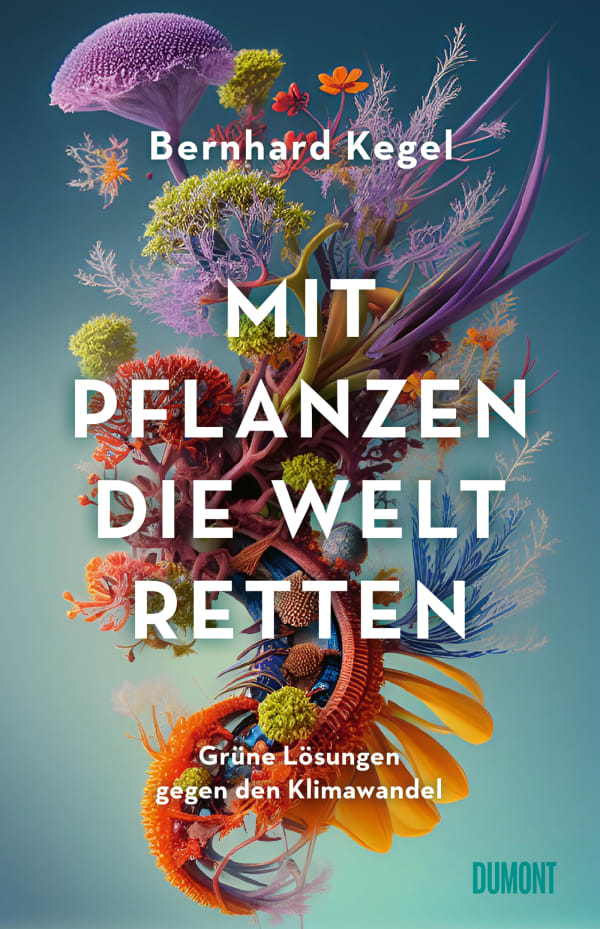

COMING SOON
Mit Pflanzen die Welt retten
Grüne Lösungen gegen den Klimawandel | Nominiert für den NDR Sachbuchpreis 2024 (Longlist)
288 pages
Pflanzen als Verbündete im Kampf gegen den Klimawandel
BERNHARD KEGEL
Mit Pflanzen die Welt retten / Plants Can Save the World. Green Solutions to Climate Change
ca. 288 pages
Autumn 2024
A political book at the cutting edge of science taking on humanity’s most urgent concern
Packed with encouraging solutions and ideas: a pep talk and a guidebook in one
“A nuanced picture of the new ecology: vivid and well-informed”
Christian Schwängerl, FAZ on ‘The Nature of Our Future’
How Plants Can Help Us to Stop Climate Change
Planet Earth is heating up. The world is currently warming at an unprecedented rate, averaging 1.2 degrees worldwide since the beginning of the industrial revolution, and almost twice that in Germany and Central Europe. If we do not keep to this century’s 1.5-degree limit, agreed at the world climate conference in Paris, we risk sliding into climate conditions that homo sapiens has never experienced in its 300,000-year history.
The thought of this is enough to drive many people towards fatalistic thinking and agonizing fear, but there is still hope: Bernhard Kegel’s latest book doesn’t seek to sugarcoat matters, instead offering technological and biological ways of stopping this catastrophe. After all, reducing or even stopping our emissions will not be enough. We will only succeed in avoiding the worst consequences of global warming by removing huge amounts of CO2 from the Earth’s atmosphere and storing it in a way that does not impact the climate further.
And in fact, that’s exactly what photosynthesis does; it is also safe and well tested. There is a broad spectrum of possible measures and fields of application, from rewetting and revitalising fenland, to algae farms, to optimising how crops photosynthesise, to building with wood and using artificial leaves to supply hydrogen and energy.
It was light and photosynthesis that facilitated and shaped higher forms of life, now they can help rescue them from one of the greatest crises they have ever faced.
Mit Pflanzen die Welt retten / Plants Can Save the World. Green Solutions to Climate Change
ca. 288 pages
Autumn 2024
A political book at the cutting edge of science taking on humanity’s most urgent concern
Packed with encouraging solutions and ideas: a pep talk and a guidebook in one
“A nuanced picture of the new ecology: vivid and well-informed”
Christian Schwängerl, FAZ on ‘The Nature of Our Future’
How Plants Can Help Us to Stop Climate Change
Planet Earth is heating up. The world is currently warming at an unprecedented rate, averaging 1.2 degrees worldwide since the beginning of the industrial revolution, and almost twice that in Germany and Central Europe. If we do not keep to this century’s 1.5-degree limit, agreed at the world climate conference in Paris, we risk sliding into climate conditions that homo sapiens has never experienced in its 300,000-year history.
The thought of this is enough to drive many people towards fatalistic thinking and agonizing fear, but there is still hope: Bernhard Kegel’s latest book doesn’t seek to sugarcoat matters, instead offering technological and biological ways of stopping this catastrophe. After all, reducing or even stopping our emissions will not be enough. We will only succeed in avoiding the worst consequences of global warming by removing huge amounts of CO2 from the Earth’s atmosphere and storing it in a way that does not impact the climate further.
And in fact, that’s exactly what photosynthesis does; it is also safe and well tested. There is a broad spectrum of possible measures and fields of application, from rewetting and revitalising fenland, to algae farms, to optimising how crops photosynthesise, to building with wood and using artificial leaves to supply hydrogen and energy.
It was light and photosynthesis that facilitated and shaped higher forms of life, now they can help rescue them from one of the greatest crises they have ever faced.
Rights inquiries
Bernhard Kegel
Bernhard Kegel, born in Berlin in 1953, studied chemistry and biology at the Free University of Berlin, followed by research work, work as an...
Bernhard Kegel, born in Berlin in 1953, studied chemistry and biology at the Free University of Berlin, followed by research work, work as an ecological expert and lecturer. Since 1993 he has published numerous novels and non-fiction books. Bernhard Kegel's books have been awarded several journalism prizes. Most recently, 'Ausgestorben, um zu bleiben' (2018) and 'Die Natur der Zu-kunft' (2021) were published by DuMont. The author lives in Berlin.
